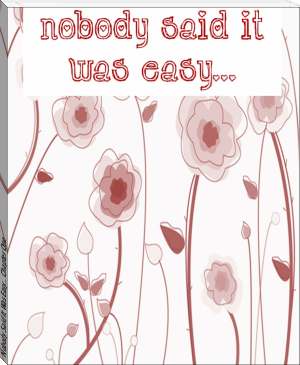Bridge Of Writing (Domination #1) by DeYtH Banger (christmas read aloud .txt) 📕

Read free book «Bridge Of Writing (Domination #1) by DeYtH Banger (christmas read aloud .txt) 📕» - read online or download for free at americanlibrarybooks.com
- Author: DeYtH Banger
Read book online «Bridge Of Writing (Domination #1) by DeYtH Banger (christmas read aloud .txt) 📕». Author - DeYtH Banger
Life and work
Dadd was born at Chatham, Kent, England, the son of a chemist. His aptitude for drawing was evident at an early age, leading to his admission to the Royal Academy of Arts at the age of 20. With William Powell Frith, Augustus Egg, Henry O'Neil and others, he founded The Clique, of which he was generally considered the leading talent.
In July 1842, Sir Thomas Phillips, the former mayor of Newport, chose Dadd to accompany him as his draftsman on an expedition through Europe to Greece, Turkey, Southern Syria and finally Egypt. In November of that year they spent a gruelling two weeks in Southern Syria, passing from Jerusalem to Jordan and returning across the Engaddi wilderness. Toward the end of December, while travelling up the Nile by boat, Dadd underwent a dramatic personality change, becoming delusional and increasingly violent, and believing himself to be under the influence of the Egyptian god Osiris. His condition was initially thought to be sunstroke.
On his return in the spring of 1843, he was diagnosed to be of unsound mind and was taken by his family to recuperate in the countryside village of Cobham, Kent. In August of that year, having become convinced that his father was the Devil in disguise, Dadd killed him with a knife and fled for France.
En route to Paris Dadd attempted to kill another tourist with a razor, but was overpowered and was arrested by the police. Dadd confessed to the killing of his father and was returned to England, where he was committed to the criminal department of Bethlem psychiatric hospital (also known as Bedlam). Here and subsequently at the newly created Broadmoor Hospital, Dadd was cared for (and encouraged to continue painting) by the likes of Drs William Wood and Sir W. Charles Hood, in an enlightened manner.
Dadd probably suffered from a form of paranoid schizophrenia. He appears to have been genetically predisposed to mental illness; two of his siblings were similarly afflicted, while a third had "a private attendant" for unknown reasons.
In the hospital he was allowed to continue to paint and it was here that many of his masterpieces were created, including his most celebrated painting, The Fairy Feller's Master-Stroke, which he worked on between 1855 and 1864. Also dating from the 1850s are the thirty-three watercolour drawings titled Sketches to Illustrate the Passions, which include Grief or Sorrow, Love, and Jealousy, as well as Agony-Raving Madness and Murder. Like most of his works these are executed on a small scale and feature protagonists whose eyes are fixed in a peculiar, unfocused stare. Dadd also produced many shipping scenes and landscapes during his incarceration, such as the ethereal 1861 watercolour Port Stragglin. These are executed with a miniaturist's eye for detail which belie the fact that they are products of imagination and memory.
After 20 years at Bethlem, Dadd was moved to the criminal lunatic asylum at Broadmoor, outside London. Here he remained, painting constantly and receiving infrequent visitors until 7 January 1886, when he died, "from an extensive disease of the lungs."
Legacy
The Fairy Feller's Master-Stroke inspired a song of the same name by the British rock band Queen. The painting also is a plot element in The Witches of Chiswick by Robert Rankin. The Wee Free Men, a novel by Terry Pratchett, edited in 2003, was in a central part inspired by it as well.
The British fantasy writer Angela Carter wrote Come unto these Yellow Sands, a radio-play based on Dadd's life.
The British composer Oliver Knussen considered naming his piece Flourish with Fireworksafter The Fairy Feller's Master-Stroke, as its composition owes a lot to the small, exquisite, quirky details in the painting and contains a similar attempted correlation of large and small scale.
Canadian author R.J. Anderson acknowledges Dadd as the basis of her fictional painter Alfred Wrenfield, who figures prominently in her young adult fantasy novel Knife (Faery Rebels: Spell Hunter in the USA).
The full name of the eccentric character Mr. Dick in David Copperfield by Charles Dickens, is Richard Babley, which echoes the name of Dickens' contemporary Richard Dadd.
In 1987 a long-lost watercolour by Dadd, The Artist's Halt in the Desert, was discovered by Peter Nahum on the BBC TV programme Antiques Roadshow. Made while the artist was incarcerated, it is based on sketches made during his tour of the Middle East, and shows his party encamped by the Dead Sea, with Dadd at the far right. It was later sold for £100,000 to the British Museum
The Fairy Feller's Master-Stroke by Richard Dadd, oil on canvas, 26 inches x 21 inches, 1855-64, Tate Gallery, London, England, UK.
Kim DAE-HAN
The Daegu subway fire
Classification: Mass murderer
Characteristics: Igniting a carton filled with gasoline inside a subway train
Number of victims: 198
Date of murders: February 17, 2003
Date of arrest: Same day
Date of birth: 1947
Victims profile: Men, women and children (subway train passengers)
Method of murder: Fire
Location: Daegu, South Korea
Status: Sentenced to life in prison on August 5, 2003. Died in prison on August 31, 2004
The Daegu subway fire of February 18, 2003 killed at least 198 people and injured at least 147. An arsonist set fire to a train stopped at the Jungangno Station of the Daegu Metropolitan Subway in Daegu, South Korea. The fire then spread to a second train which had entered the station from the opposite direction.
Kim Dae-han
The arsonist was Kim Dae-han, a 56 year-old unemployed former taxi driver who had suffered a stroke in November 2001 that left him partly paralyzed. Kim was dissatisfied with his medical treatment and had expressed sentiments of violence and depression; he later told police he wanted to kill himself, but to do so in a crowded place rather than alone. By most accounts, on the morning of February 18, he boarded train 1079 on Line 1 in the direction of Daegok, carrying a duffel bag which contained two green milk cartons filled with a flammable liquid, possibly paint thinner or gasoline.
Arson
As the train left Daegu Station around 9:53 a.m., Kim began fumbling with the cartons and a cigarette lighter, alarming other passengers who tried to stop him. In the struggle, one of the cartons spilled and its liquid contents caught fire as the train pulled into Jungangno Station in downtown Daegu. Kim, his back and legs on fire, managed to escape along with many passengers on train 1079, but within two minutes the fire had spread to all six cars. The fire spread quickly in the insulation between the layers of aluminum that form the shell of the cars, the vinyl and plastic materials in seat cushions and strap handles, and heavy plastic matting on the floors, producing thick smoke as it burned.
The operator of the train, Choi Jeong-hwan, failed to notify subway officials immediately of the fire.
Errors compound the disaster
Smoke being visible on their closed-circuit television monitors, subway officials radioed the operator of train 1080, Choi Sang-yeol, advising him to proceed with caution because there was a fire in the station. Train 1080 entered Jungangno station and stopped alongside blazing train 1079 approximately four minutes later. The doors opened only briefly, then shut, apparently in an effort to keep out the toxic smoke that had filled the station. Shortly after train 1080's arrival, an automatic fire detector shut down the power supply to both trains, preventing train 1080 from leaving the station.
Transcripts show Choi Sang-yeol made three announcements advising passengers in train 1080 to remain seated while he attempted to reach superiors. Finally, he was advised "Quickly, run somewhere else. Go up... kill the engine and go." Choi then opened the doors and fled, but in doing so he removed the master key, shutting down the onboard batteries which powered the train doors — effectively sealing passengers inside. Later investigation showed 79 passengers remained trapped inside train 1080 and died there.
Inadequate emergency equipment also worsened the disaster. Daegu subway trains were not equipped with fire extinguishers, and the stations lacked sprinklers and emergency lighting. Many victims became disoriented in the dark, smoke-filled underground station and died of asphyxiation looking for exits. Emergency ventilation systems also proved inadequate. Over 1,300 fire and emergency personnel responded and the fire itself was extinguished around 1:25 p.m.; however, the toxicity of the smoke prevented them from entering the station for another three and a half hours.
Victims
The intensity of the fire made it difficult to accurately assess the number of victims. Most were burned beyond recognition, many to the bone, and required DNA analysis to identify. A total of 191 bodies were found and identified; 6 additional bodies were found but so thoroughly destroyed that they could not be identified; and one person's possessions were identified but remains could not be located.
As the incident occurred late in the morning rush hour, most of the victims were students or young women who worked in the downtown district's department stores, which opened at 10:30 a.m. Many were able to contact loved ones on their mobile phones, and mobile phone operators released call connection and attempt records to help authorities determine who was in the station.
Investigation and coverup
Choi Sang-yeol could not be located for 11 hours after the accident, and investigators later discovered he had made contact with officials from the subway corporation during that time. The master key from train 1080 was found in an office at the Ansim train depot. Omissions from transcripts of radio communications also heightened suspicion of an attempted coverup.
On February 26, 2003, authorities arrested Kim Dae-han, who had fled to a hospital for treatment. They also arrested both Choi and six officials of the Daegu Metropolitan Subway Corporation, the head of which was fired the same day.
Aftermath
The tragedy prompted outpourings of sympathy and anger from throughout South Korea and internationally.
Officials promised to install better safety equipment in subway stations, and added spray-on fire resistant chemicals to the interiors of the cars of the Daegu Metropolitan Subway.
Six stations were taken out of service for refurbishment and restored in April 2003. The tragedy was considered by many a national embarrassment, provoking debate about whether South Korea had cut too many corners in safety during its rapid industrialization. Several metro trains throughout the country were subsequently refurbished to improve fire-resistant standards within a few years of the accident.
On August 7, the Daegu District Court convicted Choi Sang-yeol, operator of train 1080, and Choi Jeong-hwan, operator of train 1079, sentencing them to prison for five and four years respectively for criminal negligence. Kim Dae-han was convicted of arson and homicide. Although prosecutors and victims' families had asked for the death penalty, the court sentenced him to life in prison on account of his remorse and mental instability. Kim died in prison on August 31, 2004, in the city of Jinju, where he had been receiving medical treatment.
Effort to Fix Responsibility for Deadly Korean Subway Fire
By Don Kirk - The New York Times
Friday, February 21, 2003
TAEGU, South Korea, Feb. 21 ? A tragedy of errors was responsible for most of the 130 deaths in the subway fire here on Tuesday, investigators said today. The police are considering criminal charges of negligence.
Fire and subway officials in the charred station where all the victims were killed





Comments (0)